KYIV OBLAST—On the steps of a small barracks in Kyiv’s suburbs, the Witches of Bucha stand in near-freezing temperatures, listening to their commanders’ orders.
This volunteer unit, made up of nearly 90 percent women, is one of a handful of such units in Ukraine’s military. Most of these women hail from Bucha and its surrounding areas, where they witnessed and suffered the atrocities committed by Russian forces against Ukrainian civilians at the beginning of the war.
“Joining the Witches of Bucha is like taking revenge on life,” says one of the volunteers.
Their commander, Andriy Verlatiy, explains that their main mission is to defend Kyiv’s airspace and destroy the hundreds of Iranian-made Shahed drones launched almost daily by Russia against the Ukrainian capital.
These women, now serving as volunteers, balance their lives between military service and civilian responsibilities. Valentina, 49, slings an AK-47 over her shoulder and carefully secures ammunition magazines to the Velcro straps of her bulletproof vest. Like the other volunteers, she serves three 24-hour shifts. “The rest of the time, I’m at home taking care of my grandson and working at the school where I teach.”
Commander Verlatiy, tall and authoritative, finishes giving his orders. The women rush into the barracks and systematically collect their service weapons. They then pile into small pickup trucks for the 10-kilometer trip to their training site.
In the snow-covered forest, an instructor named Czech (Ukrainian soldiers share only their first names) demonstrates tactical sequences. One by one the women, bundled in heavy winter camouflage jackets, begin their drills: advancing in pairs, kneeling to fire, covering their partners, and reloading their Kalashnikovs.
Czech, his face reddened from the cold and framed by a scruffy beard, barks out orders: “Reload faster! How long does it take you? Three minutes is way too long. If you had Russians in front of you, you’d already be dead!”
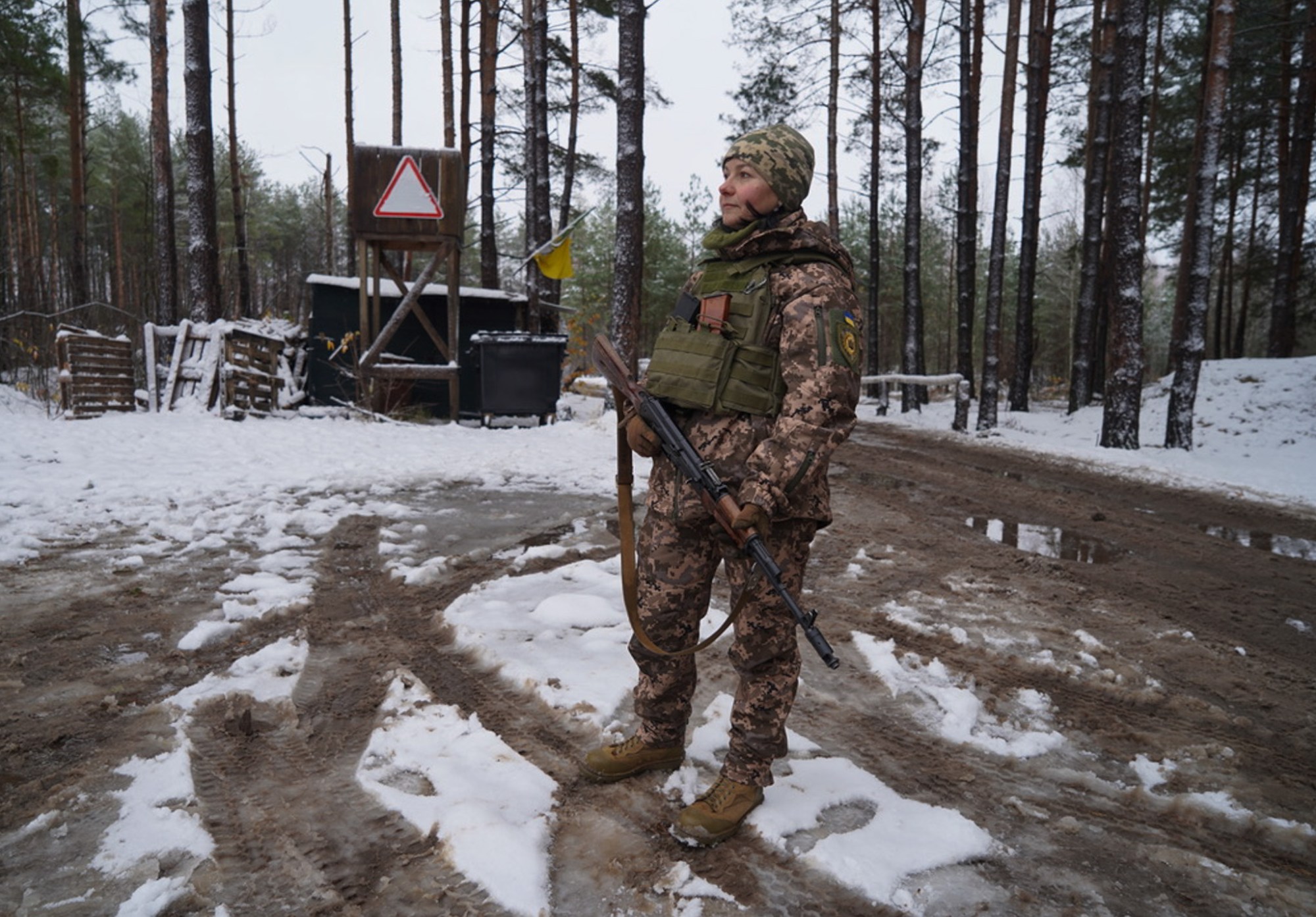
Valentina, her weapon at her feet, listens attentively to the instructions. Originally from Borodyanka, northwest of Kyiv, she and her family were trapped under Russian occupation early in the war.
“We didn’t expect the Russians to invade,” she said. “By the time we realized it, it was too late. We were stuck with no way to escape. I just barely managed to evacuate my daughter and her 1-month-old baby. It’s a miracle they survived.”
Traumatized by the occupation and the fear of its return, Valentina put off joining a volunteer battalion. But four months ago, she finally decided to enlist with the Witches of Bucha. Since then, she’s been balancing her job as a math teacher, caring for her grandson, and defending Kyiv’s skies.
‘I don’t want my grandson growing up in this world.’
Petite in stature, Valentina listens carefully to Czech’s instructions and attentively loads her AK-47’s magazine with golden bullets. “I joined because I wanted to contribute to my country’s victory. I think everyone should play their part.”
Tatyana, from Irpin, a town about 10 kilometers from Kyiv, bursts out laughing when asked her age. “That’s not a question you ask a woman!”
Despite her bright smile, Tatyana reveals she’s lost more than five family members since the war began. “My husband died early in the conflict, fighting Russians in Irpin,” she said. “My brother was killed a bit later.”
After a moment of silence, her voice breaks with sobs as she recounts how her mother, overcome with grief, passed away earlier this year: “My nephew might be dead too. He’s been missing for months. He was fighting in the East. We’ve had no news of him.”
Tatyana initially tried to enlist after her husband’s death, but the recruiter told her to go home. “Anger won’t help on the battlefield,” he said. “Only experience matters.” Since then, the Ukrainian forces, at war for more than 1,000 days, have faced a severe shortage of personnel.
Ukraine announced Monday that 43,000 soldiers have died in the war, although other estimates suggest higher numbers. In late November, The Economist estimated Ukrainian losses to be between 60,000 and 100,000 soldiers. Facing recruitment challenges, Kyiv, which already had a significant number of women in its ranks, has now formalized their inclusion in the military.
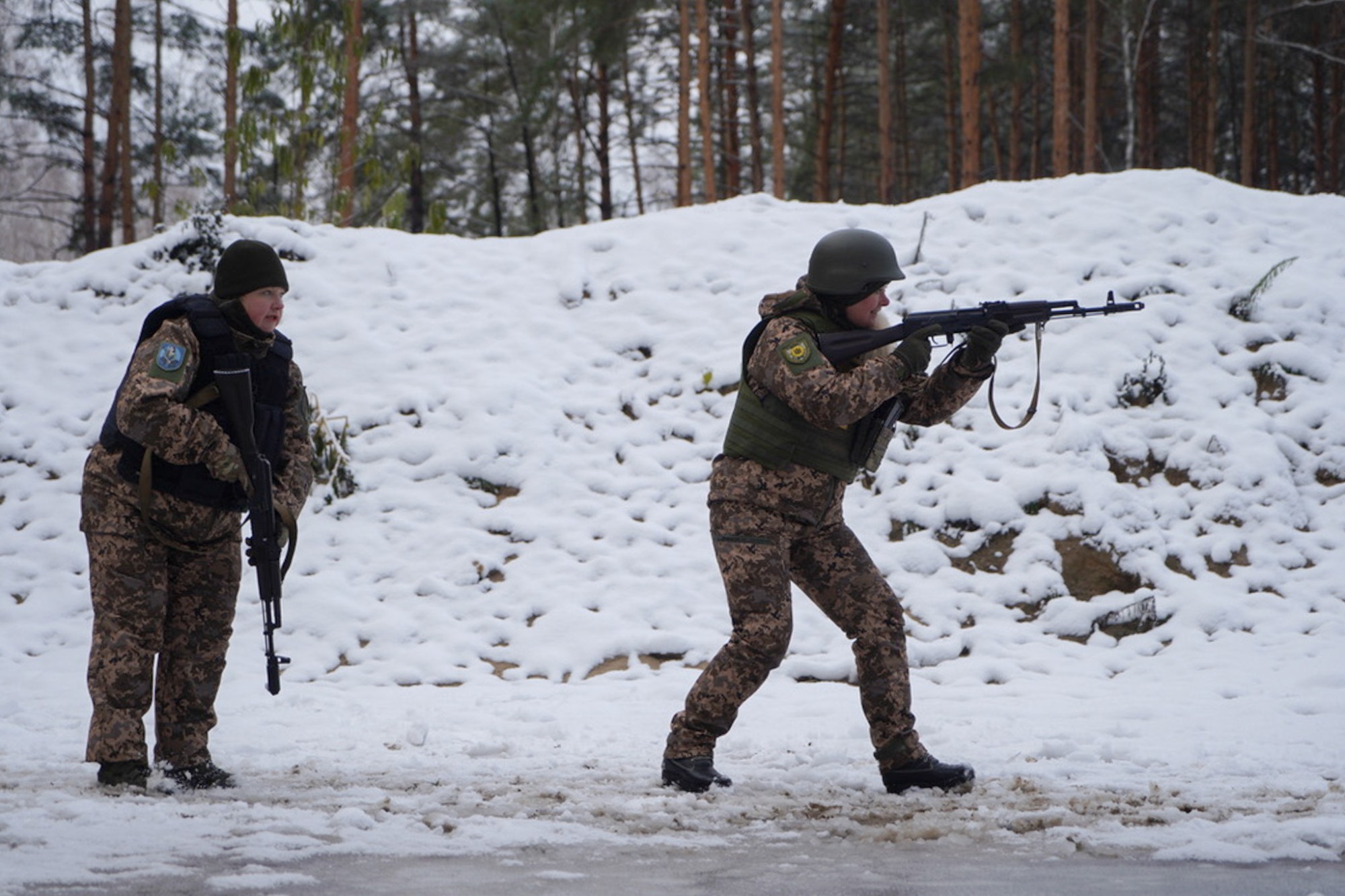
Taking advantage of this shift, Tatyana joined the Witches of Bucha six months ago.
Now she serves as a team leader, responsible for operating the massive machine gun mounted on the back of a pickup truck that enables the soldiers to track the flight of drones. Once the alert is given, one volunteer takes the wheel while another activates the equipment, using powerful spotlights to pinpoint the drones’ flight path. Tatyana, alongside another volunteer, is tasked with opening fire to shoot them down.
Smiling, she says she hasn’t felt this fulfilled in years.
“The Russians destroyed my world,” she said. “I’ve lost everything, but since joining the army, I feel like I’ve found a new family. Most importantly, I fight so no Ukrainian has to suffer like I did.”
Valentina adds that all the women here are deeply motivated, fighting to end the war as quickly as possible. “I don’t want my grandson growing up in this world. He’s not even 3 years old and already knows the sound of a drone overhead. When he hears one, he hides. When I tell him it’s my job to destroy them, he kisses me.”
Valentina believes only a military victory for Ukraine can prevent another Russian offensive. “I don’t think negotiations are possible. If we agree to cede the territories we’ve lost, Putin will see it as encouragement and attack again in a few years. I don’t want my grandson inheriting this war.”
Relieving the men.
“With a neighbor like Russia, air defense is one of the most critical elements for our country,” explains Commander Andriy Verlatiy. Valentina agrees, noting that this job can be done just as well by women as by men.
“Our men were sent to Pokrovsk (Donetsk oblast),” Valentina says. “In a world without war, I think women would have much better things to do outside the army, but we’ve lost so many men. It’s our duty to replace them wherever we can.”
Verlatiy admits that not long ago, he believed women had no place in the army. Now? “I crush anyone who says women can’t perform as well as men. In most cases, they’re even better,” Verlatiy says.
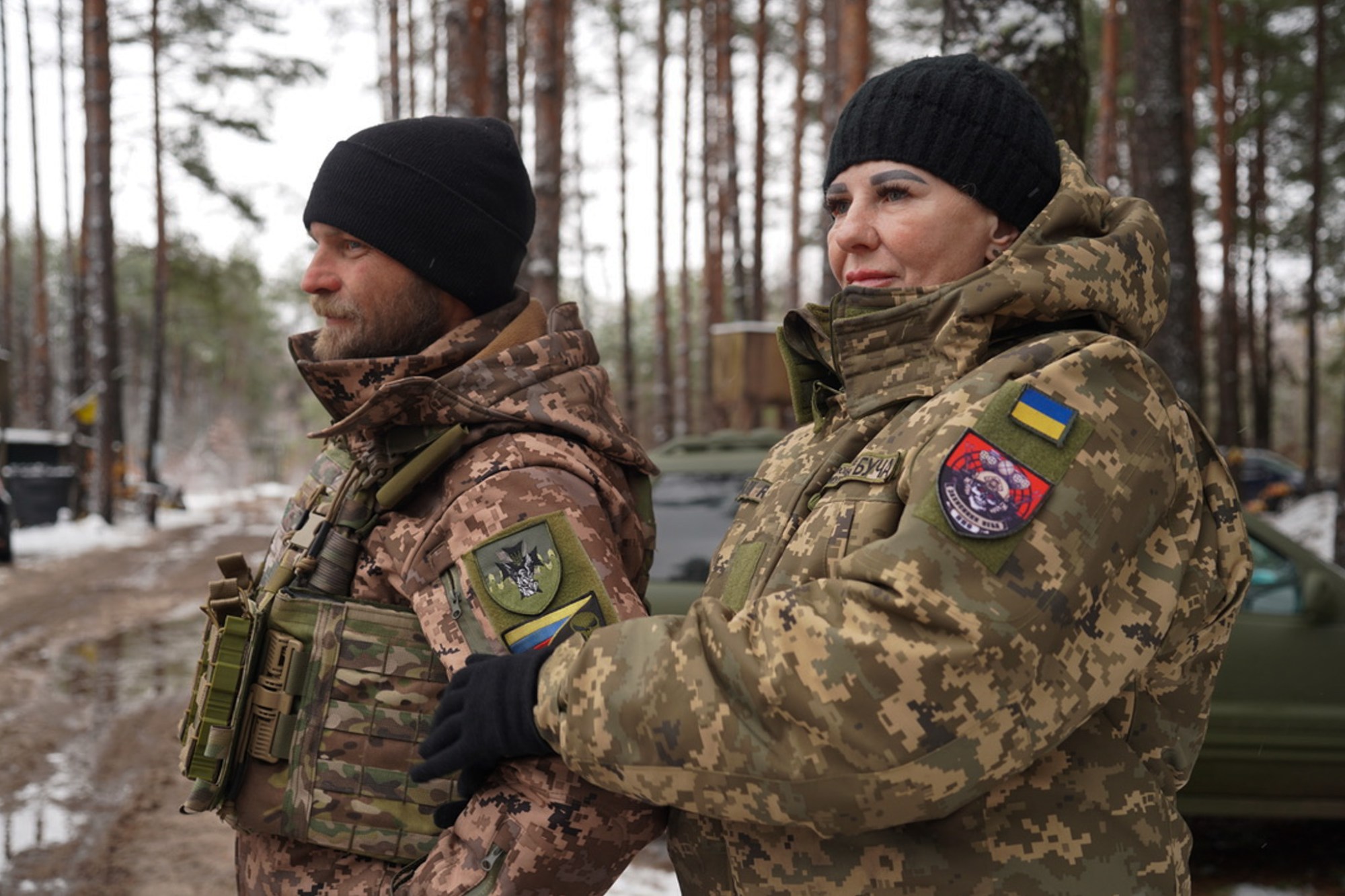
While most women in the battalion serve in the Kyiv region, far from the front lines, others have chosen to fight on the front. Oksana, 52, a former restaurant cook in Kyiv, has just returned from two months on the Pokrovsk front in Donetsk oblast, where she served as a machine gunner.
Oksana, who has tattooed eyebrows and a flawless manicure, says she has dreamed of joining the Ukrainian forces since the war began. “My son and husband enlisted at the very start, but because we have a small daughter, they didn’t want me to join them,” she said.
This year, however, Oksana decided to enlist, leaving her husband with no choice but to accept her decision.
“At first, my family didn’t support my choice. But now, my son, who serves in Kharkiv oblast, calls me and says, ‘Mom, I’m so proud of you. You’ve become so strong.’”
Slightly injured in the forests of Serebrianka, Donetsk Oblast, Oksana’s husband, Bison, is currently in Kyiv recovering. He watches her training with pride. At the end of his recovery, Bison will return to the front in a few weeks.
“Even my husband says, ‘If you’re going to fight, you won’t go alone. You’ll go with me,’” Oksana says, tearing up.
Now, she is negotiating with her commander to be deployed to the same front as her husband.
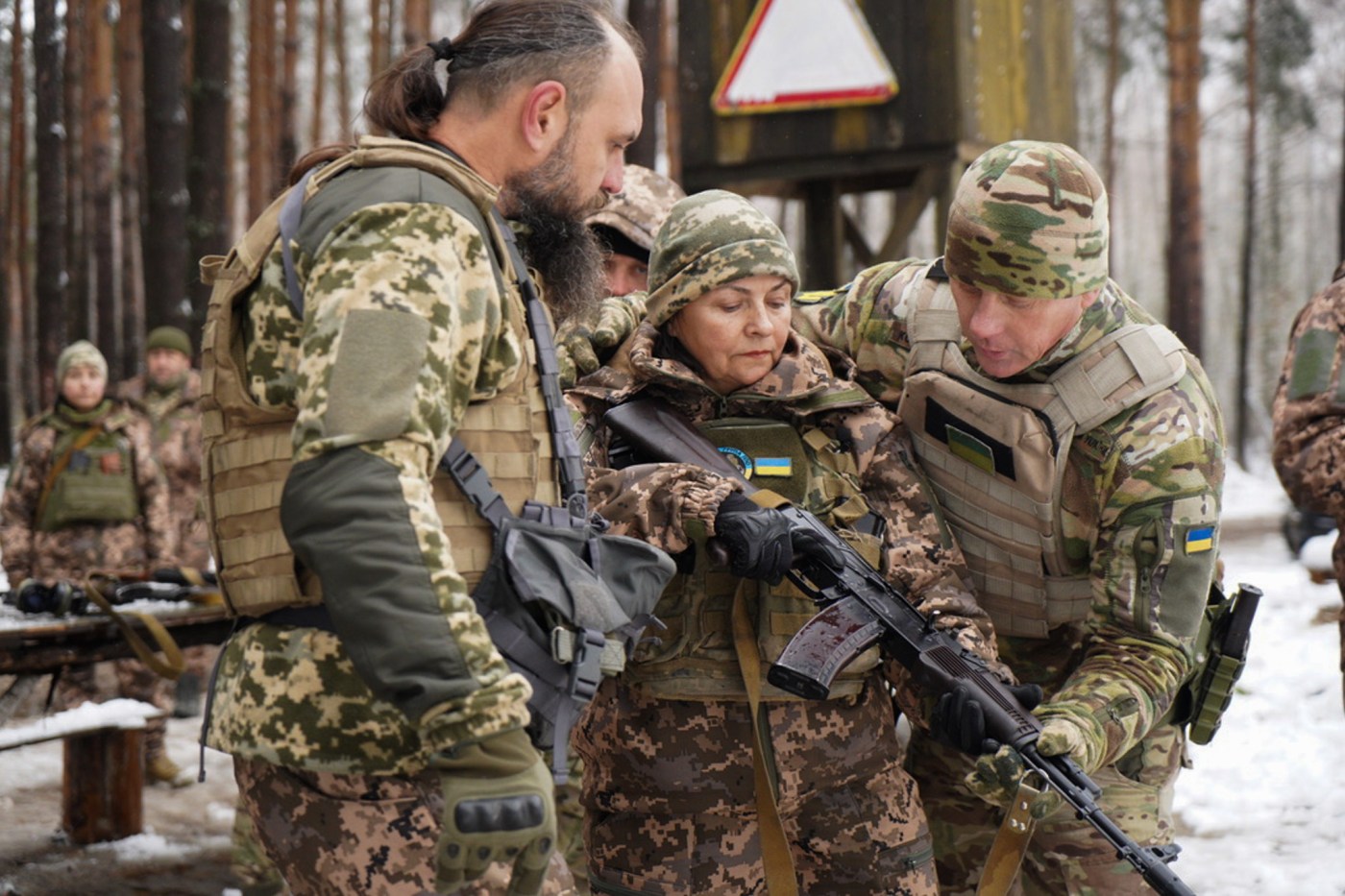
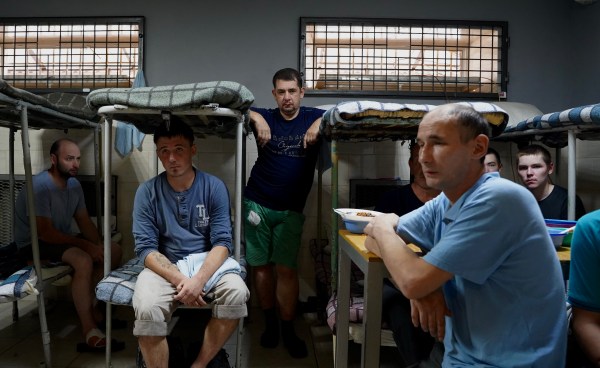

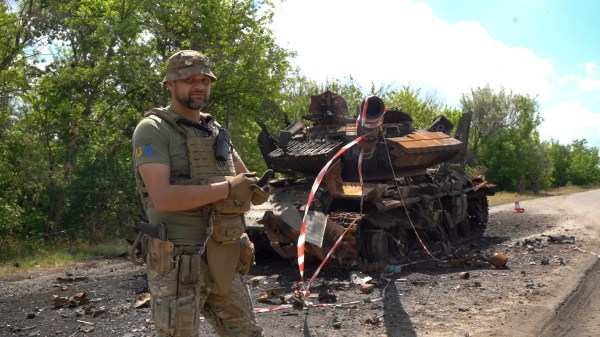

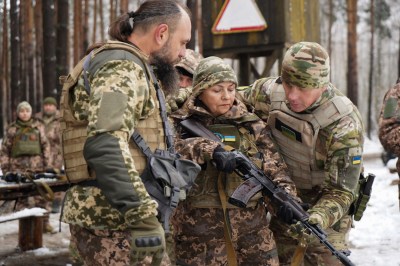
Please note that we at The Dispatch hold ourselves, our work, and our commenters to a higher standard than other places on the internet. We welcome comments that foster genuine debate or discussion—including comments critical of us or our work—but responses that include ad hominem attacks on fellow Dispatch members or are intended to stoke fear and anger may be moderated.
With your membership, you only have the ability to comment on The Morning Dispatch articles. Consider upgrading to join the conversation everywhere.